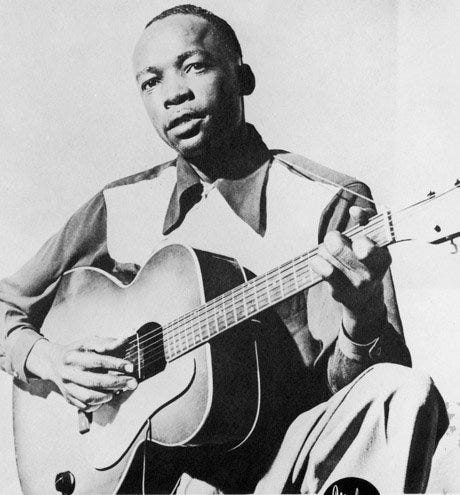Buddy Guy and John Lee Hooker Talk About The Blues
A 1996 Blues Summit in a Los Angeles Hotel Room
It was too good an opportunity to pass up. John Lee Hooker, for nearly a half-century the driving force in boogie blues guitar, and Buddy Guy, the legendary Chicago sharpshooter, were coming to Los Angeles to perform at a star-studded NARAS benefit honoring Carlos Santana. After several phone calls, both bluesmen agreed to do an interview together an hour before the show.
Our conversation took place on February 26, 1996, at the Hilton Hotel across the street from the Universal Amphitheater. Buddy Guy showed up five minutes early, eagerly anticipating John Lee Hooker’s arrival. “John and I work together a lot,” Buddy began, “but I don’t remember doing an interview with him before. He can make you laugh, I’ll tell you that. If doing an interview is like anything else I’ve experienced with him, it’ll make me laugh.” A knock on the door moments later signaled John Lee Hooker’s arrival. His helper, Steve Lee, pushed him into the room in a wheelchair. Hooker’s face lit up the instant he saw Buddy.
Hooker: Yeah!
Guy: What kind of voice is that I hear?
Hooker: That of a cripple.
Guy: Oh, you ain’t a cripple. You not crippled at all. I know what’s wrong with you. How you feel?
Hooker: Pretty good. I got arthritis.
Guy: You gotta leave them young women alone.
Hooker: I wouldn’t last long without them. Hey, Buddy, you gained some weight there. You’re as big as B! [B.B. King].
Guy: No, I can’t get that big, John. That’s a little too much for me.
Hooker: How’s the club?
Guy: It’s good! I gotta get you down, man. Some of them gals, they been sayin’, “Buddy, if you bring John Lee in, we gonna make him the happiest man….”
Hooker: Yeah, the old ones.
Guy: You know I don’t fool with nothin’ old! You taught me that when I met you in ’65! [Laughs heartily.]
What was Buddy like when you met him?
Hooker: He was a gentleman. He was young, wild. He did things different. He backed me up on a few things in the studio. He did “Motor City Burnin’” with me, which I ain’t got a copy of. You got that?
Guy: I ain’t actually never heard it. They never did give me one. I still gotta get it.
Hooker: You never did hear it? Whoo, that’s a good one. Remember the time they had the riot in Detroit? “The Motor City burnin’, and there’s not a darn thing I can do but pack my bags and go.”
Guy: We cut that in Chicago with Al Smith, you remember?
Hooker: Uh-huh. For Vee-Jay, I think. Oh, you got the guitar hummin’.
Why do blues records from the ’50s and ’60s sound so good?
Hooker: I guess it’s quality. They wasn’t puttin’ on all this stuff like they do today – fictitious stuff. It was just the real stuff then. You go in the studio, and we didn’t have 24 tracks then, 8 tracks. You’d just go on in and do it, and the records really sounded good. They sound pretty good now, but the old stuff, to me, sounds better. I got some old stuff on you too, Buddy.
Did overdubbing hurt the sound of records?
Hooker: I think so. I really do. It takes away something.
What were guitars like when you first started out?
Hooker: When I first started it was Stella, Silvertone, things like that. They didn’t have the fancy guitars they got now. They had Gibsons, but they wasn’t fancy like they is now. I didn’t even see a Gibson. I saw old Stellas and Silvertones, just things like that.
Guy: I was born so far in the country, man, I didn’t know what a damn guitar was when I first saw one.
Hooker: [Laughs.] Don’t make it funny. You’re getting interviewed.
Guy: No, I’m serious. When I first saw Lightnin’ Slim with an electric guitar, I wanted to pull the wires off it, because I thought it was a joke that he sounded like that. It was a Sunday evening. The sun about to go down in Louisiana, and this guy just came and plugged up with a little amp that looked like a radio. I said, “What the hell is that?” Then he start playing “Boogie Chillen,” and I said, “Well, that’s the way it sounds, but I don’t think the guitar’s supposed to be that loud.”
Hooker: That was recorded with just a round-hole [acoustic] with an old DeArmond pickup.
Some of your early records, like “Mad Man Blues,” have a ferocious guitar tone.
Hooker: It was the acoustic with the electric pickup.
Keep reading with a 7-day free trial
Subscribe to Talking Guitar ★ Jas Obrecht's Music Magazine to keep reading this post and get 7 days of free access to the full post archives.




